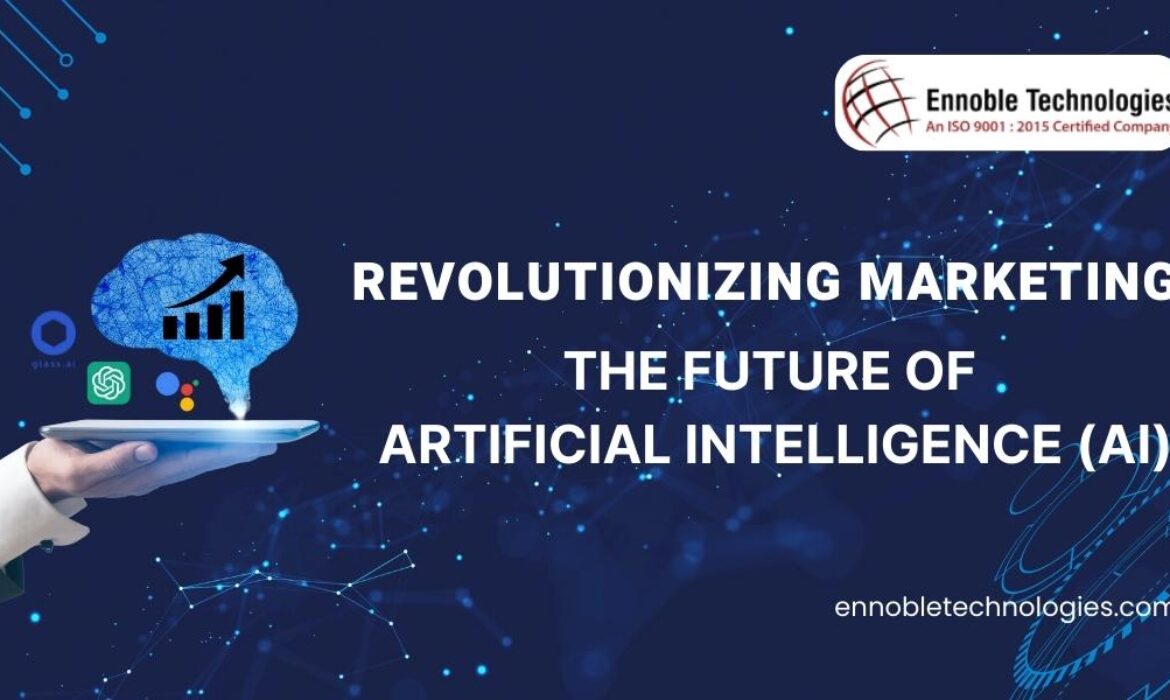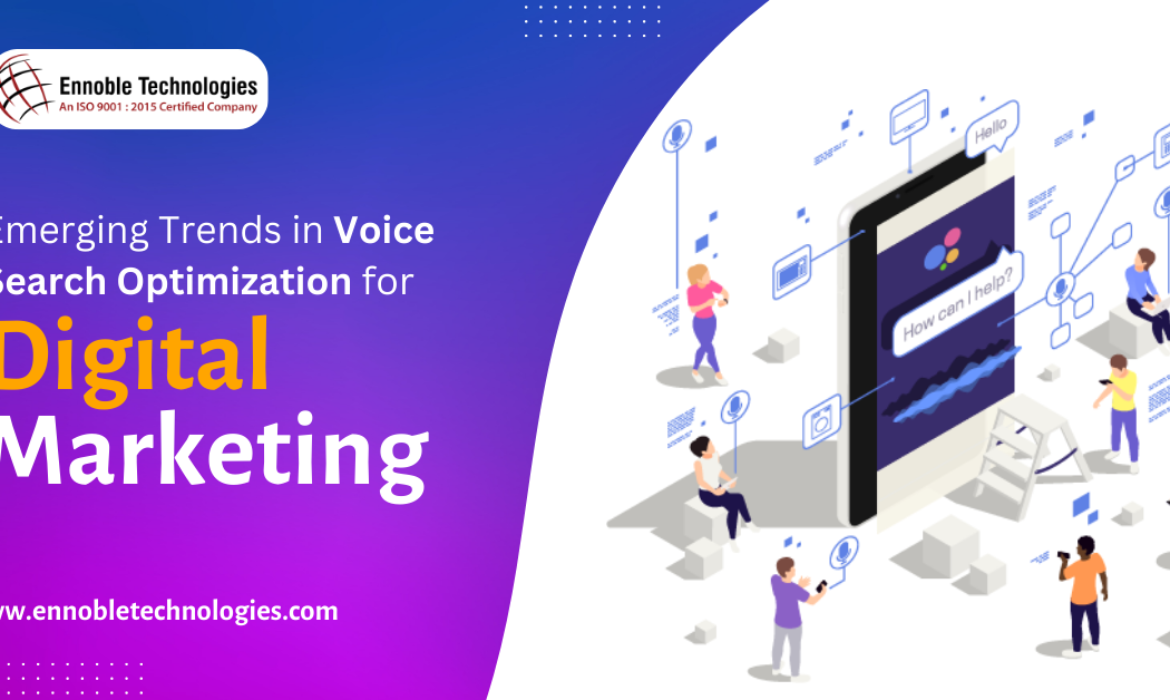Revolutionizing Marketing: The Future of Artificial Intelligence (AI)
With the rise of digital marketing, businesses are always on the lookout for a competitive edge. In recent years, Artificial Intelligence (AI) has emerged as a game-changing technology that is revolutionizing the world of marketing. AI can analyze customer data in real-time and provide insights into consumer behavior, preferences, and patterns. It can even assist in the creation and optimization of personalized marketing campaigns.
As AI continues to evolve and advance, it is predicted to become an integral part of the marketing landscape. Marketing professionals who embrace this technology early on will have a significant advantage over their competitors. In this blog, we will explore the future of AI in marketing and its potential impact on the industry.
Understanding Artificial Intelligence (AI)

Artificial Intelligence (AI) is a term used to describe the ability of machines or algorithms to carry out tasks that typically require human intelligence. This involves the ability to learn, reason, and solve problems. AI systems use a variety of techniques including machine learning, deep learning, and natural language processing to understand and interpret data.
At its core, AI relies on vast amounts of data to generate insights and make predictions. This data can come from a variety of sources such as customer interactions, social media activity, website traffic, and more. AI systems then use this data to learn and improve over time, becoming more accurate and effective at predicting customer behavior and preferences.
One of the most significant advantages of AI is its ability to process and analyze vast amounts of data in real-time. This means that businesses can use AI to create personalized marketing campaigns that are tailored to individual customers, providing a more engaging and personalized experience. Additionally, AI can help marketers to identify new opportunities and target new audiences, enabling them to stay ahead of the competition.
As AI continues to evolve and become more sophisticated, we can expect to see even more exciting applications in marketing. For example, AI could be used to create chatbots that can provide instant customer support, or to identify potential new markets for businesses to explore. Ultimately, the future of AI in marketing looks bright, and businesses that embrace this technology will be well-positioned to thrive in the years ahead.
The union of Artificial Intelligence and Marketing

The integration of Artificial Intelligence (AI) and marketing is no longer a distant future, but a reality that is already transforming the industry. The union of AI and marketing promises to revolutionize the way businesses communicate with their customers and improve the overall customer experience. Here are some of the ways in which AI is changing the face of marketing:
- Predictive Analytics – AI systems enable businesses to analyze large amounts of data about customer behavior and preferences, allowing them to predict future trends and identify potential new markets. This information can then be used to tailor marketing campaigns that are highly relevant to individual customers.
- Personalization – AI allows marketers to create more personalized experiences for customers by analyzing data about their browsing and purchasing behavior. This data can be used to create tailored content and messaging that speaks directly to the individual customer.
- Chatbots – AI-powered chatbots can provide instant customer support, answering questions and providing solutions to common problems around the clock. This not only improves the customer experience but also frees up resources that can be used elsewhere in the business.
- Content Creation – AI algorithms can be used to create highly engaging content, from blog articles to social media posts. This allows businesses to produce a large volume of quality content efficiently and cost-effectively
- Marketing Automation – AI-powered marketing automation tools can streamline many marketing processes, improving efficiency, and reducing costs. For example, AI can be used to automate email campaigns, social media posts, and even advertising campaigns.
As AI technology continues to evolve, we can expect to see even more exciting applications in marketing. Ultimately, the union of AI and marketing promises to create a more personalized and seamless customer experience that will benefit both businesses and their customers. Businesses that invest in AI-powered marketing tools will be well-positioned to stay ahead of the competition and thrive in the years ahead.
Benefits of using Artificial Intelligence in marketing

Artificial Intelligence (AI) is revolutionizing marketing and opening doors to new opportunities. Here are four benefits of using AI in marketing:
- Increased Efficiency – AI-powered marketing tools can automate repetitive tasks, freeing up time for marketers to focus on creativity and strategy. This can lead to increased efficiency, improved productivity, and cost savings.
- Data-Driven Decision Making – AI can analyze customer data to provide valuable insights into behaviors, preferences, and trends. This information can inform marketing strategies and campaigns, leading to more targeted and effective communication.
- Improved Customer Experience – By utilizing AI-powered chatbots and personalization, businesses can provide a more seamless and personalized customer experience. This can lead to increased customer satisfaction, loyalty, and retention.
- Competitive Advantage – Businesses that embrace AI in marketing will have a competitive advantage over those that do not. By staying ahead of the curve and utilizing the latest technology, businesses can stand out in a crowded market and attract more customers.
Overall, AI has the potential to revolutionize marketing and provide businesses with a valuable edge. As the technology continues to evolve, we can expect to see even more exciting applications in the marketing realm. By utilizing AI-powered tools and strategies, businesses can stay relevant and competitive in the years ahead.
Current use cases for AI in marketing

AI is being used in a variety of ways within the marketing sector, with innovative companies exploring the technology to gain a competitive edge. Here are five examples of current use cases for AI in marketing:
- Personalized Marketing – AI allows businesses to tailor their marketing efforts to individual customers. By analyzing customer data, marketers can create personalized promotions and product recommendations, leading to higher engagement and conversion rates.
- Predictive Analytics – AI can forecast future trends by analyzing past data. By understanding customer behavior patterns, marketers can predict which products and promotions will be successful and plan accordingly.
- Chatbots – AI-powered chatbots offer a 24/7 customer service experience. They can quickly and efficiently answer customer inquiries, qualify leads and even provide personalized product recommendations.
- Content Creation – AI can assist in content creation by generating headlines, captions, and even articles. This can increase productivity and streamline the content creation process.
- Programmatic Advertising – AI-powered programmatic advertising can automatically adjust campaigns based on performance, ensuring ads are shown to the right people at the right time on the most effective channels.
These use cases are just a few examples of how AI is revolutionizing marketing. As technology continues to evolve, we can expect to see even more innovative applications of AI in the marketing industry. Embracing AI can help businesses gain a competitive advantage and improve their marketing strategies in the years ahead.
The future of AI in marketing

The rapid growth of artificial intelligence (AI) technology is transforming the marketing industry. AI has the potential to revolutionize marketing by providing innovative solutions to businesses for better engagement with their customers. Here are six predictions for the future of AI in marketing:
- Even More Personalization – With the increasing amount of data available, AI will enhance personalization to the level where ads and product recommendations will be tailored specifically to each individual customer.
- AI-powered Virtual Assistants – AI-powered virtual assistants can help companies with customer service by providing immediate solutions to customer issues, as well as assistance in purchasing decisions.
- Voice Search Optimization – AI-driven voice search is the future of search. With voice search optimization, brands can develop voice-activated content, which will help them reach their customers in new ways.
- Image Recognition for Advertising – AI-powered image recognition technology will help businesses automatically categorize images based on products, locations, and patterns. This will also enable them to display targeted ads to customers.
- Better Data Analysis – AI can analyze vast amounts of data much more efficiently than humans. In the future, AI will be more successful in finding meaningful and impactful correlations and trends.
- Increased Automation – AI-driven automation will help businesses automate many time-consuming marketing tasks such as social media posting, email marketing, and lead scoring. This will allow marketers to focus on other significant tasks, including customer engagement.
As AI technology continues to evolve, businesses can expect to see significant advancements in marketing techniques and strategies. With its powerful analytical abilities, AI has the potential to transform the way marketing campaigns are planned and executed in the future.
Potential implications and ethical considerations

As with any emerging technology, artificial intelligence (AI) in marketing comes with potential implications and ethical considerations. Here are seven implications and considerations to be aware of:
- Bias – AI algorithms can perpetuate bias based on data used to train them. Marketers need to ensure any data they use is not biased or incomplete, and ensure AI is programmed with ethical guidelines.
- Privacy – As AI collects more data, potential privacy concerns continue to arise. Marketers must be transparent about data collection practices and ensure consumers can opt-out.
- Job Loss – Automation with AI could lead to job loss. Organizations must consider the impact on their staff and collaborate with them to find new roles.
- Data Security – As organizations collect more data, they must ensure they are secure from cyber-attacks. Hackers could use the data to create fake personas and purchase goods and services on behalf of unsuspecting people.
- Accountability – As AI takes over decision-making processes, accountability needs to be defined. Who will take responsibility for decisions made by AI algorithms?
- Over-reliance – AI in marketing could lead to over-reliance on algorithms and automation. Marketers still need to think critically and creatively to create effective campaigns.
- Customer Trust – As AI technology becomes more integrated into the marketing industry, organizations must gain customer trust by being transparent about their data practices and by being mindful of privacy concerns.
As AI continues to change the face of marketing, organizations must be aware of the potential implications and ethical considerations to ensure they make the most of this powerful technology while also remaining responsible and ethical.
Conclusion
In conclusion, the future of artificial intelligence in marketing is promising. As AI technology continues to revolutionize the industry, marketing professionals must be aware of the numerous implications and ethical considerations that come with it. Ensuring that AI is unbiased, privacy is protected, job loss is minimized, data security is maintained, accountability is defined, critical thinking is still present, customer trust is gained, and ethics are maintained is imperative. By doing so, companies can take advantage of the power of AI while ensuring that they remain responsible and ethical in their marketing practices. As the world becomes increasingly digitized, AI is sure to play an even more significant role in the way marketing is conducted. By embracing this powerful tool while remaining mindful of ethical considerations, organizations have the potential to dominate the marketing landscape far into the future.
Stay tuned to our space for more interesting topics of discussion.
Also Read: Mobile Friendliness – Your Key to Connecting with Users on the Go | Ennoble Technologies
Emerging Trends in Voice Search Optimization for Digital Marketers
With the highly increasing demands for smart devices and virtual assistants, voice search has become a useful factor for digital marketers. Voice search optimization is the process of optimizing your website content so it can rank on voice assistants like Siri, Alexa, or Google Assistant. It involves optimizing your content, using natural language processing (NLP), and focusing on long-tail keywords. In today’s article, we will discuss the emerging trends in voice search optimization for digital marketers and how it can help grow your business.
Voice Search and its Popularity
Voice search has grown tremendously in recent years. It is expected to gain more attention in the future. Many suggest that voice search might cover up to 50% of all searches a year or two from now.
However, people prefer using voice search because it is faster, more convenient, and provides a hands-free experience. Additionally, voice search is becoming more accurate and reliable. Soon, it will be an even more attractive option than other forms of searches.
How Voice Search Optimization is Important for Digital Marketers?
Digital marketers need to optimize their content to rank well on voice search. It is an effective way to reach their target audience faster and easier. Optimizing for voice search can help businesses improve their search rankings, increase website traffic, generate leads, and more. Additionally, it can help businesses improve their user experience.
However, optimizing for voice search can be challenging. It requires different methods than the search engine optimization (SEO) we use for websites. Businesses need to focus on conversational language and long-tail keywords. Also, one needs to ensure the content is readable and structured to be easily understood.
Emerging Trends in Voice Search Optimization
Using Natural Language Processing (NLP)
NLP is an AI technology that helps computers understand human language. With voice search, however, we use our conversational language and ask questions as we do with others. NLP helps voice assistants understand these questions and provide relevant answers. You can optimize your content for NLP by using natural language.
Featured Snippets
Featured snippets are brief snippets of text that appear at the top of search engine results pages (SERPs). They provide the answer a user is searching for. Users are more likely to receive answers from featured snippets, making them a crucial part of voice search optimization. You can use featured snippets by providing clear and to-the-point answers to commonly asked questions.
Local Search Optimization
Local search optimization means preparing our content for local search queries. For instance, people ask about nearby businesses, products, or services. Including relevant information about them in our content can help in ranking easily.
Focusing on Long-Tail Keywords
Long-tail keywords are longer, more specific search phrases that generally have lower search volumes but higher conversion rates. Users are more likely to use long-tail keywords as they ask questions briefly and conversationally.
Using Schema Markup
Schema markup is a type of microdata that helps search engines understand the content on a web page. It can help voice assistants by providing more accurate and relevant answers. Digital marketers can optimize their content by using schema markup on their websites.
How to Use Voice Search Optimization?
Here are some key strategies that can help you:
Preparing Content
You need to prepare your content for voice search by using conversational language, targeting specific long-tail keywords, and providing clear and direct answers to frequently asked questions.
Building a Friendly Website
Ensure your website is mobile-friendly, optimize page load speed, and provide structured data using schema markup.
Creating Skills
You can create voice-activated skills for smart devices to increase user interaction. This can include games, quizzes, and other engaging content that makes users feel attached and comfortable with it.
Developing a Plan
You should focus more on keyword research, content creation, and website optimization. You should also monitor your results regularly and come up with new changes as needed.
Conclusion
Voice search optimization can be quite helpful for digital marketers. If someone wants to reach their target audience faster and improve their online visibility, optimizing their content for voice search can help to gain positive results. This can be the way to stay ahead of the competition and provide customers with a better user experience.
However, digital marketers need to keep up with new advancements and make strategies accordingly. They will also need to focus on other areas such as privacy and security measures for users.
Also Read: What are the benefits of link building for SEO? – Ennoble Technologies





